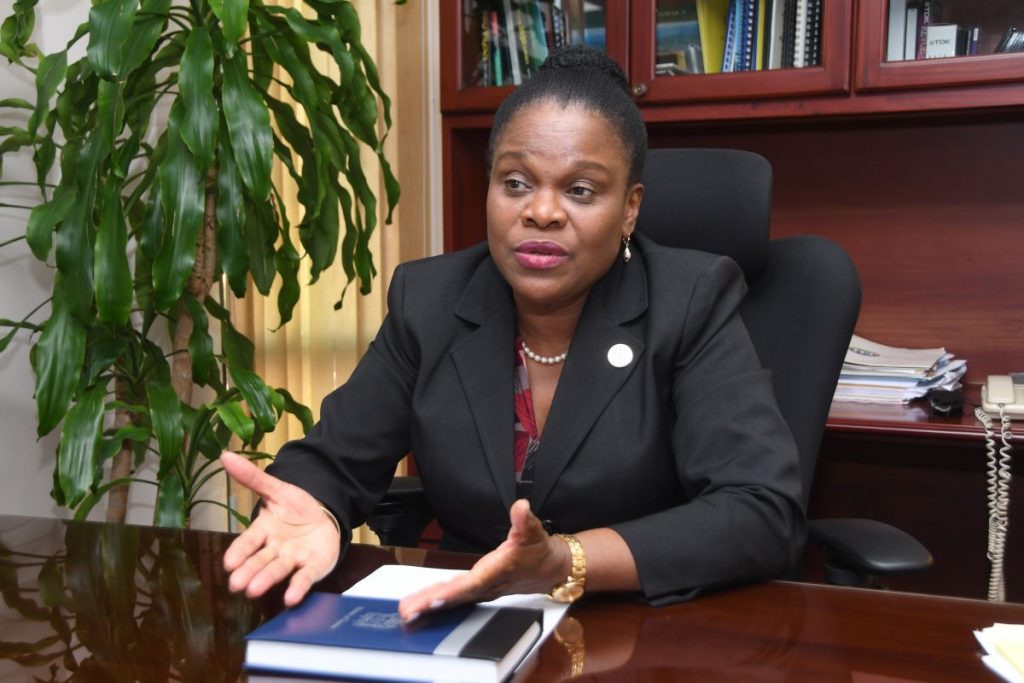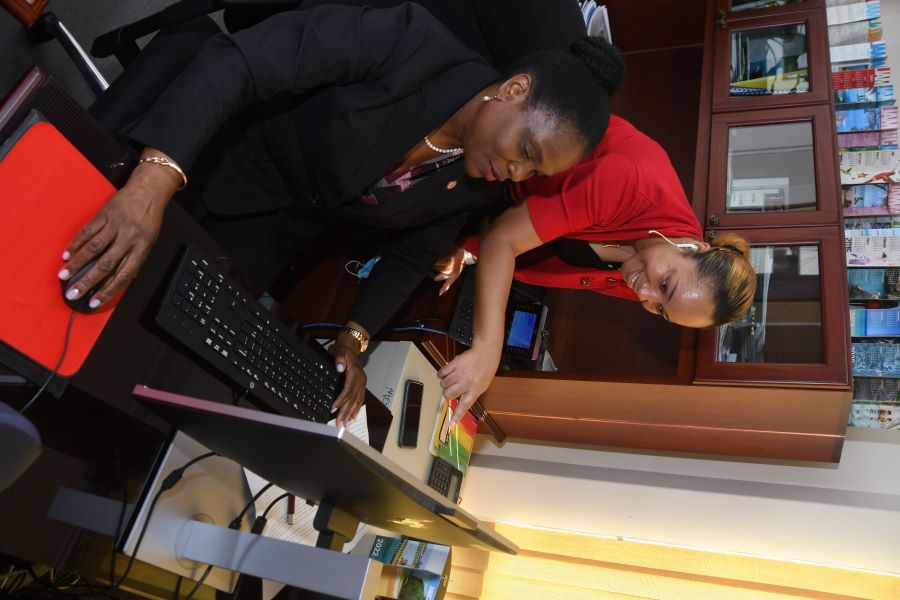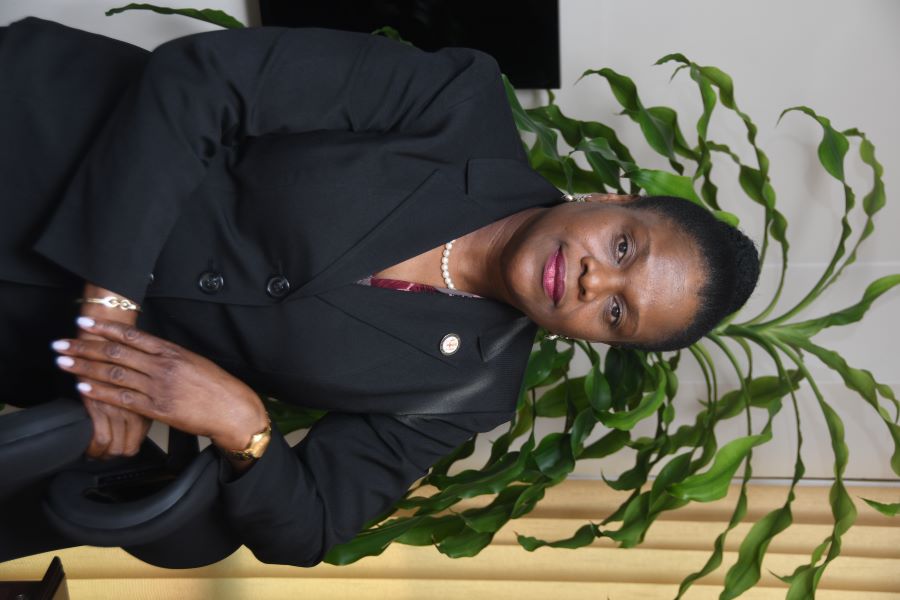AS she looks towards retiring “very soon”, permanent secretary in the Ministry of Tourism, Jennifer Griffith, is satisfied that she will leave the industry a lot better than she found it 25 years ago. In fact, when she took the role of tourism planner in 1997 the sector didn’t even have its own ministry; it was a unit within the Office of the Prime Minister. Griffith was among the key players who crafted the master plan, gave birth to the ministry, established the Tourism Enhancement Fund and, more recently, the revolutionary Tourism Workers Pension Scheme.

She’s been permanent secretary for the last 16 years, working with Aloun Ndombet-Assamba, Wykeham McNeill, and the current minister Edmund Bartlett (for whom she has high praise) during his two stints at the helm. Across administrations, Griffith and her team of civil servants have remained constant, guiding and shaping policy that has had wide-reaching implications for the country’s economic future. She’s immensely proud of the job she’s done in nurturing the “natural talent” of her team members, listing it as one of her biggest achievements. Then there’s the way she’s touched the lives of locals, letting them know — in the early days — that tourism was not just a nebulous concept that only has something to do with “foreigners”.
“The first stage of the master planning process was to really take tourism to the common man, so we had to go around the country, just talking with ordinary Jamaicans,” Griffith said in an interview with LetsTravelCaribbean.com.
She comes across as a firm, no-nonsense professional who simply gets on with the job at hand. It takes a lot to ruffle her feathers, but among the challenges she continues to face, she said, is the slow pace of the bureaucracy and a lack of the grit needed to push things along.
“It takes so much time to get these things to fruition, so… sometimes ideas die — not because they’re not good ideas or great ideas, but because they take so much time from ideation to implementation. And [I know] we have to go through the crucibles of government and administration that that requires, and we can’t not do it, but sometimes it just takes too long to get a good thing going. And so that is one of my biggest ongoing challenges,” she said. “The other is that sometimes we have the financial resources, we have the ideas, we have the technical skills, but sometimes the will to get something done and to stick with it and work it through to the very end — sometimes that can be daunting. It’s just the things that kind of prevent things from moving at the pace we want them to move, because the country is impatient of development, we need things to happen; it’s all around us. And so sometimes it’s just… the challenge it causes and the difficulty in moving from phase one to phase two; sometimes it’s just too much for me.”
She still remains hopeful that projects which have not developed as quickly as she would have liked — the ongoing work on Falmouth and Port Royal are two that come readily to her mind — will eventually be completed. The question is, will she still be the permanent secretary when that eventually happens? She’s past retirement age and has been asked to stay a bit longer, but she’s looking forward to spending more time playing with her grandchildren. And she also believes it’s time to let someone else take on the role of permanent secretary.
“I… believe in giving other persons opportunities, you know, so you can’t sit in the seat forever — you need to, at some point, move on and allow other persons the opportunity. And I’m at the stage now where I think it’s… soon time to give somebody else the opportunity to lead because we do have persons in the ministry who can lead, we have persons in the public sector who can lead, we have persons in the private sector who can take on this position. And so I don’t think I’m here forever. I shouldn’t be here forever,” she said.
Read on for more.

LetsTravelCaribbean.com (LTC): What influenced you in making your decisions academically and professionally? What was the end game you had in mind? And did things go as planned?
Jennifer Griffith (JG): Well, fundamentally, I love my country and I believe in developing the country in all its aspects — its people, its natural resources. And so for me, even going through high school, geography and geology and sociology and those things excited me because I saw where, ultimately, these are important for the growth of any company in the country. And so, I did urban planning and when I went overseas for advanced studies, I continued along that line.
But, ultimately, I’m [looking at] how best can I influence the development of the country. And so for graduate school my focus was on real estate investment, housing and housing financing, because I thought that that would be my path because housing was always a challenge in Jamaica and I knew I was always going to come back to Jamaica, and I was going to work… And so I came back to UTech [University of Technology, Jamaica] and I was lecturing for, I think it was seven years or so. And then I said, ‘Okay, I think I’ve done my stint in academia. I need to go out and do some more work in the real world.’
And so I basically did an analysis, looked at the various economic sectors [and asked] where’s growth in Jamaica, how are we going to develop, along what path? And it was just rational thinking. I analysed the workspace in the country and decided that tourism was a good place to be. There was a position, I applied, and the rest is history… I’m very matter of fact in how I go about life, generally.

LTC: What is your biggest takeaway from the last two years of the novel coronavirus pandemic?
JG: You can’t get too complacent. Tourism is subject to all kinds of shocks — pandemic, financial, other natural events, man-made events — tourism is susceptible to shocks, but tourism is very resilient. Tourism will bounce back because people think it’s their God-given right to travel; it’s their God-given right to vacations; it’s their God-given right to know what is behind those hills, what is behind this body of water. And people will therefore travel.
I saw it after [the terrorist attacks of] 9/11 when we thought, ‘Oh, my lord, people are gonna be afraid of airplanes.’ But guess what happened? It bounced right back, and so here we are at this time where we have gone through two years when the rug was literally pulled from under our feet. And tourism, as you know, was one of those sectors with the greatest impact from the pandemic.
But we didn’t roll over and die. No, we formed this task force… from day one… to deal with the pandemic, and it morphed into a recovery task force.
We were out early with some of our protocols, with the public and private sector going through all of the elements of it… Oh, we didn’t stop working for a moment — there was no inertia in tourism. Throughout COVID I was at work every day. I didn’t have work-from-home [days], I didn’t have early days; it was just another workday. You just manage the situations as they come. You just keep on doing what you have to do. We managed because we engaged, because we are team players, because we keep ourselves knowledgeable, and because we have the flexibility and agility to respond as need arises. Today we are on the rebound and the airports are full again, the hotels are doing well and feeling good, and our rates are still high because there is enough demand. So, they didn’t even have to go and do any fire sale so we’re happy.

LTC: In your current role what have been the advantages and disadvantages of being a woman?
JG: The truth is, I don’t think being female has set me back or necessarily advanced me… I have a job to do and I’m going to get on with it. I have to assess situations, I have to analyse, I have to take decisions. I work with a team of very strong men in both the private and public sectors, but that doesn’t deter me in any way. I have a role to play, I know what my job is, I speak with people freely. I say ‘Yes’ when I need to say yes, and ‘No’ when I need to say no.
I’m God-fearing, I believe I have integrity, and I have very, very good staff. I’ve been blessed with good ministers, good leaders, and good staff, a good team of team players. I have my senior team that I can depend on. You know, I sometimes give them a hard time, and I’m not always easy-going; I can be a taskmaster. But, at the same time, at the end of the day you have to go home and be able to sleep peacefully.
So I try to just take life as it comes, manage situations as they come, try to give the best advice I can. And I give advice to everybody. Anybody can call PS and ask PS whatever it is. And PS can always quarrel when she wants to quarrel, but she’ll still guide. And I think we work well together.
So when they come we solve the problems. So I don’t know if being female, maybe I think differently? I analyse things, I think things through, and when I arrive at a decision I try to act on that decision.
LTC: About how many more years can we rely on you being the PS?
JG: I don’t know but certainly not long. I think I’ll be gone very soon.





















































































































































































































































